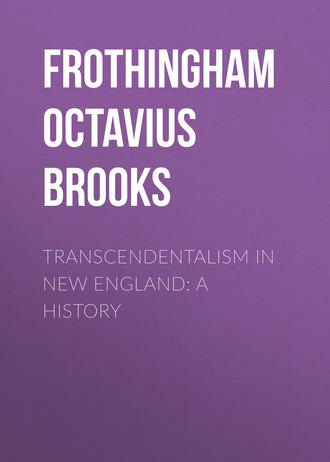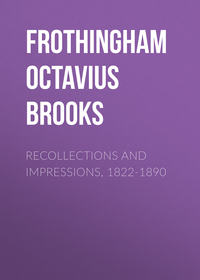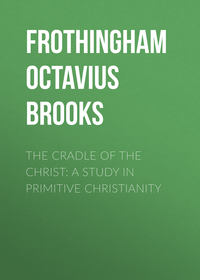 полная версия
полная версияTranscendentalism in New England: A History
Is not this to make vain the gift of God? Is not this to turn back the hand on the dial? Is not this to make men – to make ourselves – forget that not forms, but duties; not names, but righteousness and love are enjoined; and that in the eye of God there is no other measure of the value of any one form than the measure of its use?
There remain some practical objections to the ordinance into which I shall not now enter. There is one on which I had intended to say a few words; I mean the unfavorable relation in which it places that numerous class of persons who abstain from it merely from disinclination to the rite.
Influenced by these considerations, I have proposed to the brethren of the Church to drop the use of the elements and the claim of authority in the administration of this ordinance, and have suggested a mode in which a meeting for the same purpose might be held free of objection.
My brethren have considered my views with patience and candor, and have recommended unanimously an adherence to the present form. I have, therefore, been compelled to consider whether it becomes me to administer it. I am clearly of opinion I ought not. This discourse has already been so far extended, that I can only say that the reason of my determination is shortly this: – It is my desire, in the office of a Christian minister, to do nothing which I cannot do with my whole heart. Having said this, I have said all. I have no hostility to this institution; I am only stating my want of sympathy with it. Neither should I ever have obtruded this opinion upon other people, had I not been called by my office to administer it. That is the end of my opposition, that I am not interested in it. I am content that it stand to the end of the world, if it please men and please heaven, and I shall rejoice in all the good it produces.
As it is the prevailing opinion and feeling in our religious community, that it is an indispensable part of the pastoral office to administer this ordinance, I am about to resign into your hands that office which you have confided to me. It has many duties for which I am feebly qualified. It has some which it will always be my delight to discharge, according to my ability, wherever I exist. And whilst the recollection of its claims oppresses me with a sense of my unworthiness, I am consoled by the hope that no time and no change can deprive me of the satisfaction of pursuing and exercising its highest functions.
September 9, 1832.
The influence of Transcendentalism on general literature can be only indicated in loose terms. Its current was so strong, that like the Orinoco rushing down between the South American continent and the island of Trinidad, it made a bright green trail upon the dark sea into which it poured, but the vehemence of the flood forbade its diffusion. The influence was chiefly felt on the departments of philosophy and ethics. It created the turbulent literature of reform, the literature born of the "Enthusiasm of Humanity," the waves whereof are still rolling, though not with their original force. The literature of politics was profoundly affected by it; the political radicals, philosophical democrats, anti-slavery whigs or republicans, enthusiasts for American ideas, prophets of America's destiny, being, more or less wittingly, controlled by its ideas. In this department Parker made himself felt, not on the popular mind alone, but on the recognized leaders of opinion East and West. The writings of Sumner and his school owe their vigor to these ideas. In history Bancroft was its great representative, his earliest volumes especially revealing in the richness, depth, and hopefulness of their interpretations of men and measures, the faith in humanity so strongly characteristic of the philosophy he professed.
In poetry the influence is distinctly traceable, though here also it was confined within somewhat narrow limits. Bryant betrays scarcely perceptible marks of it, though he ascribed to Wordsworth a fresh inspiration of love for nature. It is hardly perceptible in Longfellow, whose verse, bubbling from the heart, gently meanders over the meadows and through the villages, gladdening daily existence with its music. Neither Bryant nor Longfellow had the intellectual passion that Transcendentalism roused. The earlier pieces of Lowell, the anti-slavery lyrics and poems of sentiment, were inspired by it. Whittier was wholly under its sway. The delicious sonnets of Jones Very were oozings from its spring. Julia Ward Howe's "Passion Flowers," though published as late as 1854, burn and throb with feeling that had its source in these heights.
The writers of elegant literature, essays, romances, tales, owed to Transcendentalism but a trifling debt, not worth acknowledging. They were out of range. It was their task to entertain people of leisure, and they derived their impulse from the pleasure their writings gave them or others. It was not to be expected that authors like Irving, Paulding, Cooper, would feel an interest in ideas so grave and earnest, or would catch a suggestion from them. But Lydia Maria Child, whose "Letters from New York" – 1841, 1843 – were models in their kind; whose stories for young people have not been surpassed by those of any writer, except Andersen; whose more labored works have a quality that entitles them to a high place among the products of mind, is a devotee of the transcendental faith. A very remarkable book in the department of fiction was Sylvester Judd's "Margaret; a tale of the Real and the Ideal; Blight and Bloom." It contained the material for half a dozen ordinary novels; was full of imagination, aromatic, poetical, picturesque, tender, and in the dress of fiction set forth the whole gospel of Transcendentalism in religion, politics, reform, social ethics, personal character, professional and private life.
As has been already remarked, the transcendental faith found expression in magazines and newspapers, which it called into existence, and which no longer survive. Its elaborate compositions were, from the nature of the case, few; its intellectual occupancy was too brief for the creation of a permanent literature. Had Transcendentalism been chiefly remarkable as a literary curiosity, the neglect of the smallest scrap of paper it caused to be marked with ink would be culpable. As it was, primarily and to the end, an intellectual episode, turning on a few cardinal ideas, it is best studied in the writings and lives of its disciples. They knew better than any body what they wanted; they were best acquainted with their own ideas, and should be permitted to speak for themselves. Earnest men and women no doubt they were; better educated men and women did not live in America; they were well born, well nurtured, well endowed. Their generation produced no warmer hearts, no purer spirits, no more ardent consciences, no more devoted wills. Their philosophy may be unsound, but it produced noble characters and humane lives. The philosophy that takes its place may rest on more scientific foundations; it will not more completely justify its existence or honor its day.
THE END1
See Kant's Critique of Pure Reason, London, 1838; Morell's History of Modern Philosophy; Chalybäus' Historical Development of Speculative Philosophy from Kant to Hegel; Lewes' Biographical History of Philosophy; Cousin's Leçons, Œuvres, Iere série, vol. 5, give a clear account of Kant's philosophy.
2
See for references. Poole's Index to Periodical Literature.
3
Vol. 1, page 89, 90.
4
Logic, p. 591. Amer. Edition.
5
Logic, p. 548. Amer. Edition.
6
Outlines of Cosmic Philosophy, Vol. II., p. 442.
7
On Intelligence, Book III., chap. I.
8
Problems of Life and Mind II. pp. 410, 415.



